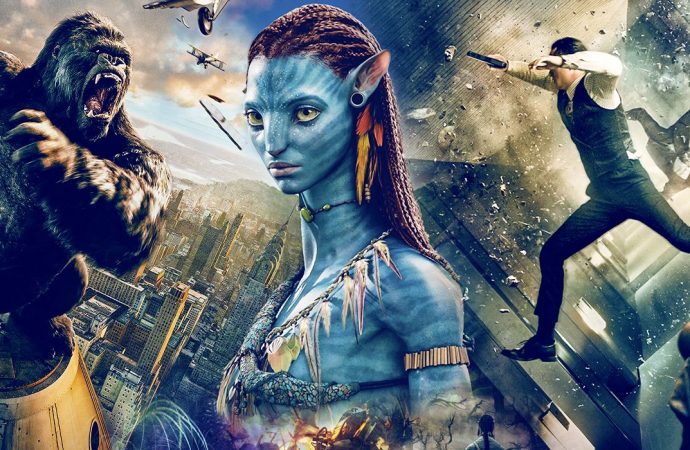Introduction Artificial Intelligence (AI) is becoming a big part of the movie-making process. From coming up with story ideas to creating stunning visuals, AI is making it easier and faster for filmmakers to produce movies. This article will look at how AI is being used in scriptwriting, visual effects (VFX), and the overall filmmaking process.
Introduction
Artificial Intelligence (AI) is becoming a big part of the movie-making process. From coming up with story ideas to creating stunning visuals, AI is making it easier and faster for filmmakers to produce movies. This article will look at how AI is being used in scriptwriting, visual effects (VFX), and the overall filmmaking process. We’ll also explore how AI Movies Visual Effects is making movies more exciting for viewers while helping filmmakers save time and money.
The Role of AI in Filmmaking
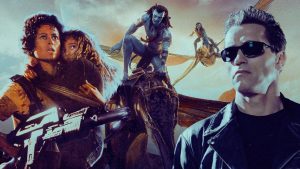
Image by: Yandex.com
AI plays an important role in many parts of filmmaking. In scriptwriting, it helps writers come up with fresh ideas and develop characters. In visual effects, AI makes it possible to create stunning images that couldn’t be captured on camera. AI is also used in editing to help find the best clips and speed up the editing process. Overall, AI makes it easier for filmmakers to create high-quality films in less
AI in Scriptwriting: A New Way to Tell Stories
Scriptwriting has always been about creativity. Writers come up with fresh ideas, develop characters, and write interesting dialogue. But now, AI is starting to help writers with some of these tasks. AI tools like OpenAI’s GPT-4 can assist in brainstorming story ideas, creating characters, and even writing dialogue.
The biggest advantage of using AI in scriptwriting is that it can look at a lot of data from past movies and scripts. By doing this, it helps writers spot trends and see what kinds of stories or characters might be popular. AI doesn’t replace writers, but it gives them new ideas and helps them organize their thoughts in creative ways.
AI and Visual Effects: Making Movies Look Amazing
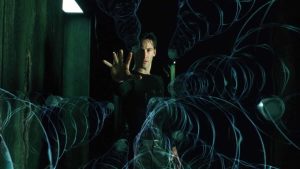
Image by: Yandex.com
AI is also changing how visual effects (VFX) are created in movies. VFX are the images and effects that can’t be captured on camera, like explosions, flying superheroes, or fantasy worlds. These effects are usually created using computer graphics (CGI), but this process can take a lot of time and effort. AI is speeding up this process and making the effects look more realistic.
AI tools can automate tasks like designing backgrounds, making character movements smoother, and creating special effects. These tools help VFX artists create high-quality effects more quickly. For example, AI can automatically adjust lighting, textures, and shadows on 3D models, which used to take a lot of time to do manually.
AI is also helping to create “digital doubles” of actors. This means actors can be recreated digitally, allowing them to appear in scenes without being there in person. This has been especially helpful in action movies where actors might perform dangerous stunts or need to be in many different places at once. AI has made visual effects even more amazing and realistic in blockbuster films, like superhero and science fiction movies.
AI in Filmmaking: Making the Process More Efficient
AI is helping in other parts of filmmaking, too. It’s being used in casting, editing, and even marketing. AI tools can look at an actor’s past performances and suggest which roles they might be good for. This helps casting directors choose the right actors for a movie.
AI is also changing how movies are edited. Instead of sorting through hours of footage, editors can use AI to automatically find the best clips. This saves a lot of time and allows the editors to focus more on the creative side of editing. Additionally, AI is being used to improve sound design and color grading in post-production.
When it comes to marketing, AI can help movie studios create ads that appeal to the right audience. By looking at what people like and watching habits, AI can make sure movie promotions are more targeted and effective.
Challenges and Concerns with AI in Movies
Image by: Yandex.com
While AI offers many benefits, there are some challenges to consider. One concern is that AI might replace human workers, especially in roles like VFX and editing. Some people worry that AI will take over jobs that were once done by talented people. However, experts argue that while AI can help with repetitive tasks, it cannot replace the creativity and skill of human filmmakers.
Another challenge is the risk of AI-generated content lacking depth. Some critics believe that AI might create stories or visuals that feel too predictable or lack emotional connection. This brings up important questions about whether AI can truly create art or if it will only make movies feel more formulaic.
Finally, there’s the issue of “deepfakes.” These are AI-generated videos that can make people appear to say or do things they never actually did. This raises concerns about privacy and consent, especially if AI is used to create fake actors or manipulate footage without permission.
How AI is Improving the Movie-Watching Experience
AI is not only changing how movies are made, but also how they’re experienced by viewers. For example, AI can recommend movies to viewers based on their watching habits. This makes it easier for people to discover new movies they might like. AI can analyze things like genre, director, or actors, and suggest films that match a person’s preferences.
Additionally, interactive films, like Netflix’s Bandersnatch, allow viewers to make decisions that change the story. These films use AI to create a personalized experience for each viewer. As AI gets better, we can expect to see more interactive movies that let viewers control the plot in real-time.
AI and Personalizing Movie Experiences

Image by: Yandex.com
AI is helping personalize movie experiences for viewers. With the help of AI, streaming platforms can recommend movies based on what you’ve watched before. This means you don’t have to spend time searching for a good movie. AI can suggest films you’re likely to enjoy by analyzing your watching history. It can even create a customized playlist of movies, offering suggestions based on your mood or interests. Personalization like this makes it easier for viewers to discover new films and enjoy a more tailored movie experience.
AI and Special Effects in Action Scenes
In action movies, special effects are often used to make scenes more exciting. AI is helping filmmakers create more realistic special effects. For example, AI can generate explosions, fire, or even virtual characters that interact with real actors. It can also help improve CGI (computer-generated imagery) to make it look more natural. AI can make these effects faster and cheaper to create, giving filmmakers more freedom to experiment and make their action scenes look even more spectacular.
AI in Film Criticism and Reviews
AI is even making its way into film criticism. Some platforms use AI to analyze movies and give reviews based on various factors, such as the storyline, acting, and pacing. AI can scan thousands of reviews from viewers and critics to understand common opinions and provide an overall rating. While human critics still offer valuable insights, AI can quickly gather feedback and help viewers decide whether a movie is worth watching. This use of AI in film reviews is helping audiences make more informed decisions about the films they choose to watch.
AI and Film Set Design
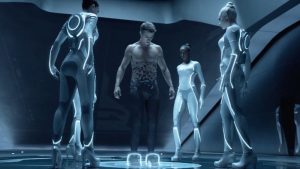
Image by: Yandex.com
AI is also being used to design movie sets. Traditionally, set designers would create detailed blueprints and build the set by hand. Now, AI can assist in designing sets by creating digital models and suggesting improvements. It can quickly generate 3D images of the set, allowing filmmakers to visualize scenes before any physical construction begins. AI can also help optimize the use of space, making sure the set is both functional and visually appealing. This technology saves time and resources, making the entire process more efficient.
Challenges of Using AI in Movies
While AI offers many benefits, there are some challenges. One concern is that AI might replace human jobs, especially in roles like visual effects and editing. Some people worry that this will lead to fewer job opportunities for filmmakers. Another challenge is that AI-generated content might not have the emotional depth of human-created stories. There’s also the risk of AI being used to create fake videos or images, known as deepfakes, which can be harmful.
The Future of AI in Movies
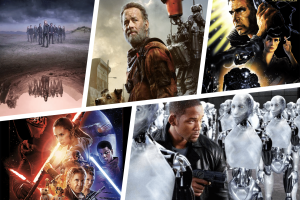
Image by: Yandex.com
The future of AI in movies is bright. As technology improves, AI will continue to change how movies are made and experienced. In the future, AI could play an even bigger role in scriptwriting, visual effects, and production. AI tools could help filmmakers create even more complex and exciting stories while saving time and money.
However, it’s important for filmmakers to use AI responsibly. AI should be used as a tool to enhance creativity, not replace it. As long as human creativity remains at the center of filmmaking, AI will continue to be a powerful ally in the movie industry.
Comparative Table: Traditional vs. AI-Enhanced Filmmaking
| Aspect | Traditional Filmmaking | AI-Enhanced Filmmaking |
|---|---|---|
| Scriptwriting | Writers create stories and dialogue | AI assists in generating ideas and organizing stories |
| Visual Effects | CGI created by artists manually | AI automates VFX creation and improves realism |
| Casting | Directors choose actors based on experience | AI suggests actors based on past performances |
| Editing | Editors choose clips by hand | AI sorts footage and finds the best clips |
| Marketing | Traditional advertising | AI targets marketing to specific audiences |
| Ethical Considerations | Focus on human creativity | Risk of job loss and AI-generated content lacking depth |
Analysis Table: Benefits and Challenges of AI in Filmmaking
| Benefit | Challenge |
|---|---|
| Speeds up production and reduces costs | AI might replace human jobs in filmmaking |
| Improves the quality of visual effects | AI-generated content may lack emotional depth |
| Helps personalize the movie experience | Issues with privacy and deepfakes |
| Makes editing and casting easier | Over-reliance on AI may hurt creativity |
Conclusion
AI is quickly becoming a vital part of the movie industry. It’s helping writers, directors, and VFX artists create better films more efficiently. From scriptwriting to visual effects, AI is making movies more exciting and easier to produce. While there are some challenges, such as job displacement and concerns about authenticity, AI’s potential in filmmaking is immense. As long as filmmakers use AI wisely, the future of cinema looks brighter than ever.

